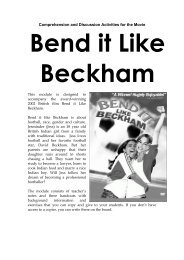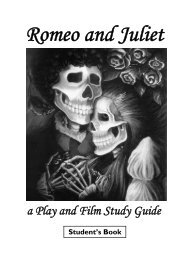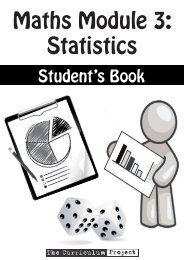Reading and Writing Module 3 - Narrating Past Events
Reading and Writing Module 3 - Narrating Past Events
Reading and Writing Module 3 - Narrating Past Events
You also want an ePaper? Increase the reach of your titles
YUMPU automatically turns print PDFs into web optimized ePapers that Google loves.
<strong>Reading</strong> <strong>and</strong> <strong>Writing</strong> <strong>Module</strong> 3 4<br />
<strong>Narrating</strong><br />
<strong>Past</strong> <strong>Events</strong><br />
The Curriculum Project
<strong>Reading</strong> <strong>and</strong> <strong>Writing</strong> <strong>Module</strong> 3<br />
<strong>Narrating</strong> <strong>Past</strong> <strong>Events</strong><br />
1. Introduction 2<br />
2. Time order <strong>and</strong> time phrases 4<br />
3. Structures to narrate: past simple 10<br />
4. Combing sentences 15<br />
5. Biography 19<br />
6. Structures to narrate: direct speech 2 2<br />
7. Summarising 2 5<br />
8 <strong>Writing</strong> assignment 2 9<br />
9. Check your writing: spelling 30<br />
Appendix: Irregular verbs 33<br />
Welcome to <strong>Reading</strong> <strong>and</strong> <strong>Writing</strong> <strong>Module</strong> 3 - <strong>Narrating</strong> <strong>Past</strong> <strong>Events</strong><br />
In this module, you will focus on:<br />
skills<br />
- Telling a story in the past<br />
- Using chronological (time) order<br />
- Researching <strong>and</strong> writing biographies<br />
- <strong>Writing</strong> dialogue<br />
- Idenitifying main points<br />
- Summarising written texts<br />
- Identifying <strong>and</strong> using correct spelling<br />
Contents<br />
1<br />
structures<br />
- Using signal words to show time order<br />
- Using prepositions of time<br />
- Revising past simple tense structures<br />
- Combining sentences<br />
- Using conjunctions<br />
- Using direct speech<br />
- Recognising common spelling patterns
DISCUSSION<br />
EXERCISE<br />
Part 1: Introduction<br />
1.1 A Princess from Shan State<br />
a. Do you know the woman in the pictures? What do you know about her?<br />
What can you infer about her from the picture?<br />
b. Read the text quickly.<br />
Sao Nang Hearn Kham, the Mahadevi<br />
(Princess) Yawnghwe was a very important<br />
figure in Shan history <strong>and</strong> the history of<br />
Burma. She was a member of the Burmese<br />
parliament, the wife of the first president <strong>and</strong><br />
later, the leader of a rebel army.<br />
She was born on May 27, 1916 in North<br />
Hsenwi, in northern Shan State. Her father<br />
was one of 33 independent rulers of<br />
mountainous Shan State. The young Hsenwi<br />
princess attended schools in Maymyo <strong>and</strong><br />
Kalaw. She loved her studies <strong>and</strong> wanted to<br />
be a “modern girl”. She didn’t want a<br />
traditional, arranged marriage. But in 1937,<br />
at age 22, her family arranged for her to<br />
marry Sao Shwe Thaike, the powerful ruler of<br />
Yawnghwe in southern Shan State. For the<br />
first few years of marriage, the Mahadevi<br />
settled into the traditional life of a Shan<br />
ruling family. Gradually, the lonely princess<br />
involved herself in state affairs. She<br />
encouraged Shan people to unite.<br />
During World War II, Japanese soldiers<br />
moved into the palace at Yanghwe. The<br />
family lived on the second<br />
floor of the palace, <strong>and</strong> the<br />
Japanese officers lived on<br />
the ground floor. Sao was<br />
afraid of the Japanese<br />
soldiers. However, the<br />
family survived three<br />
years of Japanese<br />
occupation without<br />
major problems.<br />
2<br />
The British<br />
returned in<br />
1945, but<br />
without a<br />
plan for<br />
Shan State.<br />
In February<br />
1947, Shan<br />
leaders<br />
gathered at<br />
Panglong,<br />
where they<br />
agreed to join an independent Union of<br />
Burma. After independence from the British,<br />
Sao Shwe Thaike was chosen as president. In<br />
1948 the family moved to Rangoon. There<br />
Sao Yawnghwe served as the First Lady.<br />
Later she became a member of parliament<br />
for her birthplace, Hsenwi.<br />
When the military took power on March 2,<br />
1962, Sao Shwe Thaike was a major target.<br />
The Burma Army surrounded the family’s<br />
Rangoon home <strong>and</strong> killed Sao’s third-eldest<br />
son, Sao Myee. The president was arrested<br />
<strong>and</strong> sent to jail, where he died on November<br />
21. One year later Sao gathered her children<br />
<strong>and</strong> fled to Thail<strong>and</strong>.<br />
Sao set up a house in Chiang Mai, <strong>and</strong> her<br />
younger children attended school there. The<br />
exiled princess worked with her second son,<br />
Chao Tzang, to form a rebel army, the Shan<br />
State Army (SSA). In 1969 she left to join her<br />
eldest son in Canada. She died in 2003, at the<br />
age of 86.
EXERCISE<br />
ACTIVITY<br />
DISCUSSION<br />
DISCUSSION<br />
ACTIVITY<br />
c. Here are some short paragraphs about the text. Put the paragraphs in order.<br />
1. The Burmese military took over the<br />
country <strong>and</strong> killed Sao’s husb<strong>and</strong>. She fled<br />
to Thail<strong>and</strong>.<br />
2. The Japanese army came to Burma, <strong>and</strong><br />
spent three years in Sao’s palace.<br />
3. Sao moved to Chiang Mai <strong>and</strong> organised<br />
the SSA. Later she went to Canada, where<br />
she died.<br />
What are these short paragraphs called?<br />
Hint: If you turn to the contents page of this module, you will find this word.<br />
3<br />
4. Sao Nang Hearn Kham has had an<br />
interesting life. She is very important to<br />
Shan <strong>and</strong> Burmese history.<br />
5. The Shan signed the Panglong agreement.<br />
Burma got independence from the<br />
British, <strong>and</strong> Sao’s husb<strong>and</strong> became<br />
Burma’s first president.<br />
6. Sao didn’t want a traditional lifestyle,<br />
but her family arranged for her to marry the<br />
Prince of Yanghwe. She beame involved<br />
in politics.<br />
d. Circle the words in the text you don’t underst<strong>and</strong>.<br />
Work in groups of three or four. Does anyone else in your group know these words?<br />
Make a list of words that nobody in your group underst<strong>and</strong>s.<br />
Tell these words to the class, <strong>and</strong> make a class list on the board.<br />
Can anyone guess the meanings of these words?<br />
e. What do you call this type of text?<br />
Hint: If you turn to the contents page of this module, you will find this word.<br />
What tenses were used in this text?<br />
This is one type of narrative writing. Where else can you find narrative writing?<br />
1.2 Questions<br />
a. In groups, think of five questions to ask about Sao Yawnghwe.<br />
The answers must be available in the text.<br />
Join with another group, <strong>and</strong> ask them your questions.<br />
Give them 30 seconds to find the answer to each question. Do they get them correct?<br />
b. What else would you like to know about Sao Yawnghwe?<br />
In your groups, think of some questions you could ask about her.
EXERCISE<br />
EXERCISE<br />
EXERCISE<br />
EXERCISE<br />
Part 2: Time order <strong>and</strong> time phrases<br />
2.1 Story from pictures<br />
Look at these pictures. They they tell a story, but they are not in the right order.<br />
1.<br />
3.<br />
a. Number the pictures so they are in the right time order.<br />
b. Write one or two sentences for each picture decribing what happened.<br />
c. Put your sentences together to make a paragraph.<br />
2.2 Using time order<br />
a. The sentences below belong to the same paragraph, but they are not in the correct order.<br />
Number them so they follow a logical time order.<br />
A.<br />
____ After that, they spent some time<br />
relaxing in Kentung, <strong>and</strong> finally they went<br />
back home to M<strong>and</strong>alay.<br />
____ From there, they went to Lashio <strong>and</strong><br />
Hsipaw.<br />
1 The rock b<strong>and</strong> ‘Floating Stone’<br />
toured around Shan State.<br />
____ Their first concert was in Taunggyi.<br />
4<br />
2.<br />
4.
EXERCISE<br />
EXERCISE<br />
C.<br />
____ They enjoyed working together very<br />
much, <strong>and</strong> at the end of the year, they<br />
got married.<br />
____ In July, she hired a clever young man to<br />
help with the computers.<br />
____ She was good at her work, <strong>and</strong> after<br />
three months she became the<br />
office manager.<br />
____ In January, Naw Paw got a job in an<br />
office in Pa-an.<br />
b. Write the sentences into paragraphs.<br />
2.3 Signal words<br />
B.<br />
____ As the family became larger, finding<br />
names became harder <strong>and</strong> harder.<br />
____ Jacob <strong>and</strong> Tin Tin Ma wanted a large<br />
family.<br />
____ After their tenth child was born, they<br />
couldn’t think of a name at all, so they<br />
called him ‘Ten’.<br />
____ When their first child was born, they<br />
decided on a name very easily.<br />
a. What are the signal words in this paragraph? Signal words show the order that things happened.<br />
Circle the signal words in the paragraph.<br />
Hakim had a busy morning. First, he cleaned his kitchen. Then he sat down <strong>and</strong><br />
wrote some letters on his computer. After that he went into town to go to the<br />
post office, the market <strong>and</strong> the computer shop. Next, he went back home <strong>and</strong><br />
cooked some lunch. Finally, he sat down to rest.<br />
Signal words (transitions)<br />
Signal words show time relationships. We use signal<br />
words to guide the reader from one idea to the next.<br />
5
BRAINSTORM<br />
EXERCISE<br />
EXERCISE<br />
b. How many signal words do you know? Make a class list on the board.<br />
The easiest signal words number the order things happen, e.g.<br />
First , light a fire.<br />
Second , wash your rice. .<br />
Third , put water <strong>and</strong> salt into the pot with the rice.<br />
Fourth , cook the rice.<br />
Finally , eat your rice with some delicious curries.<br />
People mostly use these signal words in instructions.<br />
Here are some more sentences with signal words. Don’t forget the punctuation!<br />
Before Hakim went to town, he cleaned his kitchen,<br />
<strong>and</strong> then he washed his hair.<br />
Next , he ironed his shirt.<br />
After that , he left the house.<br />
c. Fill the gaps with signal words.<br />
I had a terrible morning. Everything went wrong. First , my<br />
alarm clock didn’t go off, so I woke up an hour late. __________ I burned<br />
my h<strong>and</strong> when I was making breakfast. __________ I ran out of the house<br />
without taking my homework. The teacher gets angry if anyone doesn’t bring<br />
their homework, so I had to go back <strong>and</strong> get it. __________ I ran down the<br />
road. People on the way looked at me in a strange way. I didn’t want to talk<br />
with them as I worried that I could miss my first lesson. ___________, I<br />
walked the two kilometres to my school only to discover that it was Sunday!<br />
2.4 Practice with signal words<br />
a. Roi Nu wants to open a small shop, but she doesn’t have any money. She has to do many<br />
things before she can open her shop! Read the list <strong>and</strong> put the things in order.<br />
____ Find a good place to have a shop<br />
____ Buy some things to sell<br />
____ Open the shop<br />
1 Borrow some money<br />
____ Set up the shop<br />
b. Roi Nu’s shop is open. Write a paragraph explaining how she did it.<br />
Roi Nu opened a small shop. First, she borrowed some money from her friend.<br />
6
ACTIVITY<br />
ACTIVITY<br />
BRAINSTORM<br />
EXERCISE<br />
d. Work in groups. Choose one of these situations:<br />
1. Your group is planting a vegetable garden<br />
2. Your group is organising a picnic<br />
3. Your group is organising a concert to raise money for your school.<br />
First, make a list of the steps you take to do this.<br />
Second, put these steps in order.<br />
After that, write them in complete sentences, with appropriate signal words.<br />
Finally, write these sentences in a paragraph. Use the present tense.<br />
e. Pretend it is one week after you did these things. One member of your group<br />
tells the class what you did, <strong>and</strong> how you did it.<br />
We planted a<br />
vegetable garden last week.<br />
First, we found some l<strong>and</strong>...<br />
2.5 Prepositions of time<br />
a. What prepositions do you know that express time?<br />
Read through the text on page 2 for ideas.<br />
b. Write the correct prepositions in the gaps.<br />
1. I lived in Pa-an from 1960 _____ 1968.<br />
2. Thida was born ______ 1992, _____ May.<br />
3. He was born ______ October 31 ______<br />
4:00 ______ the afternoon.<br />
4. I’ll meet you for lunch ______ Thursday<br />
______ noon.<br />
5. Our school closes ______ the hot season.<br />
Prepositions of time<br />
Prepositions show time order. Here are the basic ones:<br />
Date<br />
in March, in October<br />
in the rainy season<br />
on Saturday, on Tuesday<br />
on July 28, on the 3rd of May<br />
on New Year’s Day<br />
at the end of the year<br />
at the beginning of class<br />
at Christmas, at Thingyan<br />
from Monday to Friday<br />
from 2002 - 2004<br />
7<br />
Time<br />
at five o’clock, at 12.45<br />
at midday, at night<br />
in the afternoon, in the evening<br />
from 2.00 to 4.30<br />
6. Mi Chan Mon goes to Maymyo every<br />
weekend to visit her parents. She takes<br />
the train ______ Saturday ______ 9:00<br />
______ the morning <strong>and</strong> arrives in<br />
Maymyo ______ 1 p.m.<br />
7. There’s a market in our village ______<br />
Wednesday.<br />
8. Thail<strong>and</strong> has a holiday ______ the King’s<br />
Birthday, ______ December.
EXERCISE<br />
EXERCISE<br />
c. Write your own gap-fill exercises like those in b.<br />
Write five sentences with missing prepositions of time, <strong>and</strong> give them to another student.<br />
How many did they answer correctly?<br />
d. Identify <strong>and</strong> correct the mistakes in this paragraph. There are eight incorrect prepositions.<br />
Dr Chao Tzang Yanghwe, the son of Sao Shwe<br />
Thaike <strong>and</strong> Sao Nang Hearn Kham, died in<br />
Monday, July 26, 2004. He died at 6:30,<br />
Vancouver time (20:30, Bangkok Time) at his<br />
home in Canada.<br />
Chao Tzang Yawnghwe was born on 26 April<br />
1939 in Shan State, then known as Federated<br />
Shan States. In 1961 to 1963 he worked as an<br />
English teacher at Rangoon University. On<br />
March 1962 General Ne Win took power in a military<br />
coup. Chao Tzang’s younger brother, Sao<br />
Myee, was killed by government soldiers on<br />
March 2, <strong>and</strong> his father, the president of Burma,<br />
was taken to prison. He died at November. Chao Tzang left Rangoon on April<br />
the next year to join the Shan State Army.<br />
From July to December<br />
he took part in the failed<br />
peace talks with<br />
Rangoon, <strong>and</strong> in 1971,<br />
he co-founded the Shan<br />
State Army’s political<br />
arm, Shan State<br />
Progress Party. He left<br />
Thail<strong>and</strong> in 1985, <strong>and</strong><br />
moved to Canada.<br />
In Canada, he studied<br />
for a PhD in Political<br />
Science, which he finished<br />
on 1997. He was<br />
an advisor to the<br />
NCGUB <strong>and</strong> NRP. On<br />
March 2004 he became<br />
chairman of the Ethnic<br />
Nationalities Solidary<br />
Chao Tzang with his mother <strong>and</strong> siblings:<br />
L-R: Sao Ying Sita, Sao Harn, Sao Hso Hkan Hpa (Tiger), Sao Hearn<br />
Hkam, Chao Tzang <strong>and</strong> Sao Myee. Seated are Sao Leun <strong>and</strong> Haymar.<br />
<strong>and</strong> Co-operation Committee. He died three months later, of brain cancer.<br />
“Our task is not only to say or show the world that the SPDC is BAD, BAD,<br />
BAD, it is also to convince the world that we are the available alternative, that<br />
we are smart, we get things done. ”<br />
- Chao Tzang Yawnghwe, February 2004<br />
8
ACTIVITY<br />
EXERCISE<br />
ACTIVITY<br />
EXERCISE<br />
e. Look at this timeline. Here are some more events in the life of Sao Nang Hearn Kham <strong>and</strong><br />
her family. Read through the texts on page 2 <strong>and</strong> page 8. Work in groups. Add more information<br />
to the timeline.<br />
Sao Hearn Hkam is<br />
born in Hsenwi,<br />
Shan State<br />
2.6 What happened?<br />
Sao Hearn Hkam<br />
escapes to Thail<strong>and</strong><br />
<strong>and</strong> forms SSA with<br />
her son Chao Tzang<br />
Panglong<br />
agreement is<br />
signed<br />
a. What are some important things that have happened to you?<br />
Think of things that happened:<br />
- Today<br />
- This week/month/year<br />
- Three years ago<br />
- When you were a child<br />
Write sentences about each event, giving time or date, e.g.<br />
At half past eight I had a shower<br />
In 1997 my baby sister was born<br />
9<br />
Chao Tzang Yawnghwe<br />
leaves the SSA, moves<br />
to Thail<strong>and</strong><br />
b. Write the four time/dates on a piece of paper, <strong>and</strong> give it to your partner.<br />
Look at your partner’s times/dates <strong>and</strong> ask ‘What happened...?’ questions.<br />
What happened in July?<br />
c. Write a paragraph about events in the life of your partner.<br />
I went to my uncle’s wedding.<br />
Harn Yawnghwe, Sao<br />
Hearn Kham’s youngest<br />
son, becomes NCGUB<br />
representative to the<br />
European Union.
EXERCISE<br />
DISCUSSION<br />
EXERCISE<br />
Part 3: Structures to Narrate - past simple<br />
3.1 Mystery of the missing necklace.<br />
a. Read the text.<br />
Laila was a young Muslim woman<br />
from Rangoon. Although she was<br />
an English language graduate, she<br />
couldn’t find a job in Burma, so she<br />
went to Bangkok in 1996. She was<br />
lucky, she soon found a job as a<br />
maid for a wealthy family, the<br />
Maneewans. Her job was not so bad<br />
- she looked after the baby, cooked<br />
<strong>and</strong> cleaned. She loved the baby,<br />
<strong>and</strong> the cooking <strong>and</strong> cleaning were<br />
OK. She earned quite good money,<br />
<strong>and</strong> saved most of it. The only<br />
problem was John, the family’s<br />
driver. He said he was in love with<br />
Laila. He wrote her letters, gave her<br />
presents <strong>and</strong> asked her to marry<br />
him. One day, he tried to kiss her<br />
when nobody was looking. Laila<br />
hated John. ‘I will NEVER marry<br />
you! Now go away <strong>and</strong> leave me<br />
alone!’ she shouted.<br />
Do you believe her? Who do you think took the necklace? Why?<br />
How do you know?<br />
b. Circle all the verbs in the past simple tense. Classify them into regular <strong>and</strong> irregular forms.<br />
Write them in the table.<br />
10<br />
The next year the family lost all their<br />
money in the Asian financial crisis.<br />
They couldn’t afford to keep servants,<br />
so Laila, John <strong>and</strong> the other<br />
servants lost their jobs. Laila was sad<br />
to leave the baby, but she had a lot<br />
of money to take back to her family.<br />
She said goodbye to the family, <strong>and</strong><br />
left Bangkok.<br />
The next morning, when Mrs<br />
Maneewan woke up, her beautiful<br />
gold necklace was not in her drawer.<br />
Instead, there was a note.<br />
I tuk your nekliss.<br />
I no have job no have money.<br />
goodby, Laila.<br />
The Maneewans rang the police. They<br />
arrested Laila at the Bangkok bus<br />
station. ‘I didn’t take it - it wasn’t me!’<br />
Laila begged.<br />
regular form s irregular form s<br />
loved was
EXERCISE<br />
EXERCISE<br />
3.2 Forming the regular past simple tense<br />
a. Complete the grammar box.<br />
Verbs in the past simple tense<br />
If the verb ends in:<br />
1) a consonant want add -ed wanted<br />
2) a consonant + y try change y to _______ tried<br />
3) a vowel + y play _______ _______<br />
4) a consonant + double the consonant,<br />
vowel + consonant drop add _______ _______<br />
5) x or w show _______ showed<br />
6) a vowel love _______ _______<br />
7) two syllable verbs with _________________ ,<br />
stress on the last syllable prefer _________ _______<br />
8) two syllable verbs with<br />
stress on the first syllable listen add _______ _______<br />
b. Do you know all the verbs in the box? If you don’t, look them up in your dictionary.<br />
Fill the gaps with correct forms of the past simple.<br />
stop repair disappear travel confess graduate fix enjoy<br />
work decide avoid study apologise question blame<br />
1. Laila ____________ hard at university, <strong>and</strong> ____________ in 1996.<br />
2. She ____________ to Thail<strong>and</strong> to find a job.<br />
3. In Bangkok, she ____________ as a maid for the Maneewan family.<br />
4. She ____________ looking after their baby.<br />
5. John was the Maneewans’ driver, <strong>and</strong> he also ____________ things around the<br />
house. He ____________ the TV <strong>and</strong> other electrical appliances.<br />
6. Laila didn’t like John. She ____________ him as much as possible.<br />
7. Laila <strong>and</strong> John ____________ working when the Maneewans lost their money.<br />
8. Laila ____________ to return to her family.<br />
9. John ____________ with Mrs Maneewan’s necklace. He ____________ Laila.<br />
10. When the police ____________ John, he ____________ to his crime.<br />
11. He ____________ to Laila <strong>and</strong> the Maneewans.<br />
11
DISCUSSION<br />
BRAINSTORM<br />
EXERCISE<br />
ACTIVITY<br />
3.4 Irregular past tense verbs<br />
a. How do you learn irregular verb forms in the past?<br />
Think back to when you first had to learn them.<br />
What techniques did you use? Do you know any good ones?<br />
b. Look at the verbs in the boxes. In groups, think of more verbs for each box.<br />
Hint: focus on the sounds, not the spelling of the verbs.<br />
1. begin - began<br />
swim - swam<br />
4. cost - cost<br />
put - put<br />
c. What are the rules for each group?<br />
1. final vowel sound changes from ‘i’ to ‘a’ (as in fat)<br />
2.<br />
3.<br />
4.<br />
5.<br />
6.<br />
2. blow - blew<br />
know - knew<br />
5. send - sent<br />
build - built<br />
d. Work in groups of three.<br />
Student A says an irregular verb.<br />
Student B says the past tense.<br />
Student C makes a sentence using the verb in the past tense.<br />
Then student B chooses the next verb.<br />
12<br />
3. keep - kept<br />
read - read<br />
meet - met<br />
6. break - broke<br />
ride - rode<br />
sell - sold<br />
saw<br />
see<br />
I saw three fat<br />
cats outside the<br />
window
EXERCISE<br />
ACTIVITY<br />
ACTIVITY<br />
3.5 Verb search<br />
a. Find the past tense forms of the verbs in the box. Words can be , , or .<br />
f w e t n s h o o k u<br />
l o s t b m x o p n n<br />
e r r c c e n d e e d<br />
w d a g f a c t d l e<br />
o l n f o n y a i t r<br />
r h d i u t m u m i s<br />
e y r m g e d g t e t<br />
k s a s h i w h h s o<br />
e w t r t o g t r j o<br />
s d a o i u t h e l d<br />
a e h t o l d z w I n<br />
y s s b u d s t a n g<br />
b. Make your own verb search, using<br />
irregular past tense verbs. Give it to<br />
another student.<br />
3.6 Rhyming verbs<br />
Work in pairs. Partner A says a verb-past tense combination, e.g. blow-blew.<br />
Partner B replies with a rhyming combination, e.g. know-knew.<br />
Partner A replies with another combination, e.g. grow-grew.<br />
tell-told<br />
If you can’t think of a rhyming verb, get it wrong, or take too<br />
long, your partner gets a point.<br />
sell-sold<br />
The winner is the partner with the most points.<br />
13<br />
shake swim<br />
fly forget<br />
underst<strong>and</strong> hold<br />
make tell<br />
lose mean<br />
kneel wear<br />
fight shoot<br />
st<strong>and</strong> become<br />
buy throw<br />
teach
EXERCISE<br />
EXERCISE<br />
ACTIVITY<br />
EXERCISE<br />
ACTIVITY<br />
3.7 Negatives <strong>and</strong> questions in past simple<br />
a. Complete the grammar box.<br />
Negatives <strong>and</strong> questions in the past simple tense<br />
When we make negatives <strong>and</strong> questions in the past simple tense, we use the auxiliary<br />
verb _______ .<br />
_______ you see the newspaper this morning? No, I _______ see it. I was busy.<br />
Where _______ you put my pen? I _______ touch it. Look, it’s on the table.<br />
b. Write sentences that are true for you. Use the past tense (negative or positive).<br />
e.g. you/wake up/at 5.00? I woke up at 5.00 or I didn’t wake up at 5.00<br />
a) you/eat fish for breakfast<br />
b) you/go to Post-10 school/last year<br />
c) you/study Thai/three years ago<br />
d) your parents/live in Burma/in 1990<br />
e) you/get malaria/when you were a baby<br />
f) you/do your homework/last night<br />
g) your family/build a new house/in the dry season<br />
h) you/watch a video/last night<br />
i) you/have a best friend/in primary school<br />
j) your teacher/wear a white shirt/yesterday<br />
c. In pairs, ask <strong>and</strong> answer questions with the information in b.<br />
When you answer, provide more information, e.g.<br />
Did you wake up at 5.00? - No I didn’t. I woke up at 6.30.<br />
- Yes, I woke up <strong>and</strong> then I brushed my teeth.<br />
3.8 Practice with questions<br />
a. Turn to page 8. Look at the biography of Chao Tzang Yawngwe, <strong>and</strong> write wh- questions you<br />
could ask about his life.<br />
What? Where? When? How many? Who? Why? How?<br />
b. Work in groups of three. Choose the best five questions. Make sure you know the answers!<br />
Ask your questions to another group. They are not allowed to look at their books - try to answer<br />
from memory!<br />
14
BRAINSTORM<br />
ACTIVITY<br />
DISCUSSION<br />
3.9 Word association story<br />
a. In turns, everyone in the class says a noun or verb.<br />
The teacher will write the words on the board.<br />
b. Write a story. You must use all the words on the board, in the past tense.<br />
I lay in a tree. My buffalo arranged some flowers on the ground...<br />
Part 4: Combining Sentences<br />
4.1 Subjects <strong>and</strong> verbs again<br />
a. Which of these sentences contains a compound subject?<br />
Which contains a compound verb?<br />
It’s raining, <strong>and</strong> the wind is blowing.<br />
I’m waiting for my brother.<br />
We stayed <strong>and</strong> studied late at school.<br />
I’m cold <strong>and</strong> uncomfortable.<br />
My shirt <strong>and</strong> my jacket are wet.<br />
I didn’t bring my raincoat, <strong>and</strong> I left my umbrella at my friends house.<br />
My brother <strong>and</strong> I hate <strong>and</strong> fear the dark.<br />
The first sentence - It’s raining, <strong>and</strong> the wind is blowing - is a compound sentence, as there are<br />
two separate s/v combinations.<br />
The second sentence has a simple subject <strong>and</strong> a simple verb.<br />
The third sentence, We stayed <strong>and</strong> studied late at school - has a compound verb.<br />
The fourth sentence has a simple subject ‘I’ <strong>and</strong> a simple verb ‘am’.<br />
The fifth sentence, has a compound subject: shirt <strong>and</strong> jacket.<br />
The sixth sentence is a compound sentence, as there are two separate s/v combinations.<br />
The last sentence, My brother <strong>and</strong> I hate <strong>and</strong> fear the dark - has a compound subject - My<br />
brother <strong>and</strong> I - <strong>and</strong> a compound verb - hate <strong>and</strong> fear. It is not a compound sentence, as the<br />
subjects <strong>and</strong> verbs are together, (SSVV) rather that mixed (SVSV).<br />
In this module, we are not looking at compound sentences. You’ll meet them in <strong>Module</strong> 5.<br />
15<br />
tree<br />
lie<br />
buffalo<br />
arrange
EXERCISE<br />
EXERCISE<br />
ACTIVITY<br />
REVIEW<br />
b. Underline the subjects <strong>and</strong> verbs in this text, <strong>and</strong> write an S or a V above them.<br />
s v<br />
My great-uncle had his eighty-fifth birthday last week. He is very<br />
fit <strong>and</strong> healthy, <strong>and</strong> exercises every day. He doesn’t smoke or<br />
drink alcohol. Every day, he walks for an hour <strong>and</strong> lifts weights.<br />
He likes to have parties <strong>and</strong> invite all our family to his house.<br />
Twenty or thirty people can sit in his house <strong>and</strong> eat. He never gets<br />
tired <strong>and</strong> is always the last to go to bed. Last summer my great-<br />
uncle <strong>and</strong> his friends organised a big football competition.<br />
Gr<strong>and</strong>children were in one team, gr<strong>and</strong>parents were in the other<br />
team. Old people <strong>and</strong> young people ran around <strong>and</strong> kicked the<br />
ball all afternoon. In the end, the gr<strong>and</strong>parents’ team won 5-4!<br />
c. Which are simple sentences, <strong>and</strong> which are compound sentences?<br />
d. Think about your own family. Write one sentence with a compound subject, one sentence<br />
with a compound verb, <strong>and</strong> one sentence with a compound subject <strong>and</strong> a compound verb.<br />
Make two sentences true, <strong>and</strong> one sentence false.<br />
e.g. My brother <strong>and</strong> sister have three aeroplanes.<br />
My mother speaks <strong>and</strong> writes Pa-O language.<br />
My cousins <strong>and</strong> their friends buy <strong>and</strong> sell used cars.<br />
Give your sentences to a partner. Can they guess which sentence is false?<br />
4.2 Remember your subject / verb agreement!<br />
a. Check the subject-verb agreement on these sentences. Some have compound subjects.<br />
If the subject <strong>and</strong> verb do not agree, change the verb.<br />
1) I like to cook thagu with coconut.<br />
2) My young brother <strong>and</strong> sister likes it very much.<br />
3) Sometimes coconut <strong>and</strong> sugar is very expensive.<br />
4) I uses a lot of coconut, but not much sugar.<br />
5) Sometimes I add a tin of milk or some chocolate.<br />
6) I cooked thagu <strong>and</strong> hot chocolate drink last Thursday.<br />
7) People comes to my house on Thursdays to watch TV.<br />
8) Everybody really enjoy my cooking.<br />
16
BRAINSTORM<br />
EXERCISE<br />
EXERCISE<br />
4.3 Conjunctions<br />
a. How many conjunctions do you know? Make a class list on the board.<br />
b. Complete the grammar box. Which conjunctions are used in simple sentences?<br />
Conjunctions<br />
a. <strong>and</strong> joins similar things. I like bananas <strong>and</strong> oranges.<br />
b. joins similar things I don’t like papayas mangoes.<br />
in negative sentences.<br />
c. also joins choices. I’ll buy some bananas some oranges.<br />
(I can’t buy both)<br />
d. joins contrasting things. I like bananas I don’t like papayas.<br />
e. shows a result. I like bananas I bought a kilo of them.<br />
c. Work in pairs. Use <strong>and</strong> or or to join these sentences.<br />
1. I don’t play table tennis. I don’t play badminton.<br />
I don’t play table tennis or badminton.<br />
2. I can speak English well. I can write English well.<br />
3. I can’t speak French. I can’t speak Chinese.<br />
4. Fishpaste is my favourite food. Rice is my favourite food.<br />
5. You can have pork curry. You can have chicken curry. (you must choose one).<br />
6. Saw Htoo watched a video last night. Jenny watched a video last night.<br />
I watched a video last night.<br />
7. Yesterday I cleaned my house. I cooked a big meal. I invited my friends over.<br />
8. Do you want to leave now? Do you want to stay here? (you must choose one).<br />
9. Chao Tzang Yawngwe, a famous Shan politician, studied in Burma.<br />
Chao Tzang Yawngwe, a famous Shan politician, studied in Canada.<br />
10. He finished his PhD in 1997. He became an advisor to the NCGUB.<br />
17
DISCUSSION<br />
EXERCISE<br />
4.4 Practice with combining sentences<br />
a. What is the best way to join these sentences?<br />
Laila, an English language graduate from Burma, lived in Bangkok.<br />
Laila, an English language graduate from Burma, worked as a servant for the Maneewans.<br />
John, an ugly, dishonest man, lived in Bangkok.<br />
John, an ugly, dishonest man, worked as a servant for the Maneewans.<br />
Rules for sentence combining<br />
- Don’t repeat words if possible.<br />
I like football. I like volleyball. = I like football <strong>and</strong> volleyball<br />
I like football <strong>and</strong> I like volleyball.<br />
- You can change words, for example noun to pronoun, or single to plural form.<br />
Yee likes football. Ma Ma likes football. = Yee <strong>and</strong> Ma Ma like football.<br />
- Don’t leave out important details.<br />
I play football on Tuesdays. I play volleyball on Fridays at the school.<br />
= I play football on Tuesdays, <strong>and</strong> volleyball on Fridays at the school.<br />
I play football on Tuesdays <strong>and</strong> vollyball on Fridays.<br />
b. Combine the sentences in each group to make one sentence.<br />
There are many correct possibilities!<br />
Then combine all your sentences into a paragraph.<br />
1. Yesterday, I had a horrible day.<br />
Yesterday, I had a difficult day.<br />
2. I got up late.<br />
I washed quickly.<br />
3. I didn’t eat any breakfast.<br />
I didn’t drink any coffee.<br />
4. I had an important meeting.<br />
The meeting was in the city.<br />
5. I could get a bus.<br />
I could get a taxi. (only one)<br />
6. I decided to take a bus<br />
I went to the bus station.<br />
The bus station is far from my house.<br />
18<br />
7. A football team was waiting for the bus.<br />
A high school class was waiting for the bus.<br />
Twenty monks were waiting for the bus.<br />
8. I missed the next bus.<br />
I had to wait for two hours.<br />
9. I was hungry <strong>and</strong> dirty.<br />
I was late for the meeting.<br />
10. At the meeting, I didn’t speak well.<br />
I didn’t give my opinions.<br />
11. When I returned, my boss was very angry.<br />
My boss said I was stupid.<br />
12. I hope she doesn’t fire me.<br />
I hope she doesn’t reduce my salary.
BRAINSTORM<br />
BRAINSTORM<br />
ACTIVITY<br />
EXERCISE<br />
Part 5: Biography<br />
5.1 What’s in a biography?<br />
a . What information can you find in a biography?<br />
Look at the biographies of Sao Nang Hearn Kham <strong>and</strong> Chao Tzang Yawngwe for ideas.<br />
In groups, write a list of information you can find in a biography.<br />
Date of birth<br />
Family<br />
education<br />
b. You can use the ‘questions’ formula to think of things to write in a biography.<br />
In groups, think of all the questions you can ask about someone - ‘X’.<br />
Make a ‘biographical questions’ mind-map.<br />
Who were X’s friends?<br />
Who did X admire?<br />
who<br />
what was X like?<br />
what were X’s jobs?<br />
what did X think? What did X believe in?<br />
biography<br />
19<br />
what<br />
c. Work in pairs - work with someone who is not in your group. If possible, work with someone<br />
you don’t know very well.<br />
Ask each other the questions, <strong>and</strong> write down their answers.<br />
What other things are interesting about your partner? Ask <strong>and</strong> write as much as you can.<br />
d. Choose some of the most interesting information about your partner.<br />
Write this information into a short biography.<br />
Remember to use the correct tenses:<br />
- If you write about something that happened in the past, use the past tense.<br />
In 5th st<strong>and</strong>ard, Naw Naw won a prize for best English student.<br />
- If you write about something that is true now, use the present tense.<br />
Naw Naw likes reading. She reads every night before she goes to sleep.
DISCUSSION<br />
ACTIVITY<br />
BRAINSTORM<br />
ACTIVITY<br />
5.2 Some biographical details<br />
a. Look at the photo of Naw Louisa Benson<br />
What do you know about her?<br />
What can you guess about her?<br />
b. In pairs, read these details about her life. Put them in chronological order.<br />
1 . She married Glenn, <strong>and</strong> had three<br />
children. She spoke out many times<br />
about the situation in Burma, the<br />
student uprisings in 1988, <strong>and</strong> the plight<br />
of the Karen people.<br />
2. When she returned home, she became<br />
an actress. She became very famous <strong>and</strong><br />
popular. General Ne Win hired her to<br />
teach his children acting skills.<br />
3. She spent a year in America, studying<br />
at Tufts University. In America she<br />
made many friends, including Glenn<br />
Craig, another student.<br />
4. Now she is working on behalf of the<br />
villagers who were displaced to make<br />
way for the Yadana Gas Pipeline. She<br />
says that Unocal, the US oil company, is<br />
guilty of using forced labour to build<br />
the pipeline.<br />
5. Her old student friend, Glenn Craig,<br />
contacted her. He persuaded her to<br />
move to the United States. Her father,<br />
brothers <strong>and</strong> sisters were already in<br />
the States.<br />
20<br />
6. She took comm<strong>and</strong> of<br />
her husb<strong>and</strong>’s unit, <strong>and</strong><br />
led them back to the<br />
jungle. She stayed in the<br />
jungle for a while, but she<br />
suffered badly from<br />
malaria.<br />
7. Louisa Benson was<br />
born to a Karen mother <strong>and</strong> a Jewish<br />
father. They lived in Rangoon, where her<br />
father owned a trucking company.<br />
8. Two years later, she married Brigadier<br />
Lin Tin, of the KNU. He was killed when<br />
he went to attend peace talks in 1965. “I<br />
don’t know how he was assassinated,”<br />
Louisa said quietly. “The only thing I<br />
know is that he never came back.”<br />
9. Louisa enjoyed sports <strong>and</strong> beauty<br />
contests. In the early 1950’s, she won<br />
‘Miss Burma’ twice.<br />
10. In 1962, the military seized power.<br />
Her father supported the Karen armies<br />
fighting the Burmese military, so he was<br />
sent to jail for three years.<br />
c. Look at your questions in 5.1 b. How many of these questions does the text answer?<br />
d. Cover the text. Spend two minutes writing as much about Naw Louisa Benson as you can.<br />
Now join in a group of three or four. As a group, write Naw Louisa’s biography.
B R A I N ST OR M<br />
ACTIVITY<br />
ACTIVITY<br />
DISCUSSION<br />
5.3 Putting information together<br />
a. Look at the picture of Thakin Kodaw Hmaing.<br />
What do you know about him?<br />
What can you guess about him?<br />
b. Here is some information about Thakin<br />
Kodaw Hmaing. There are a lot of missing words.<br />
In groups of three, put this information into<br />
complete sentences.<br />
young boy studied monastary M<strong>and</strong>alay<br />
British government arrested teenager<br />
continued study many different places<br />
Rangoon work editor. 1905 novel history<br />
Moulmein<br />
British colonial government. Wrote books<br />
independence.<br />
World War two underground against British. Later against Japanese<br />
chairperson Doburma organisation. 1948 civil war. Called for peace in Burma<br />
wanted world peace. Travelled Burma speeches world peace<br />
interested socialism. Travelled socialist countries<br />
died 1964. ‘Father of Burmese literature’<br />
c. Compare your group’s writing with another group. Have you got the same facts?<br />
Now look at or listen to the teacher’s version. Are the facts the same?<br />
5.4 Getting biographical information<br />
a. Look at the information about Naw Louisa Benson <strong>and</strong> Thakin Kodaw Hmaing.<br />
Where do you think this information came from?<br />
21
B R A I N ST OR M<br />
B R A I N ST OR M<br />
EXERCISE<br />
EXERCISE<br />
b. Where could you find out more information about Naw Louisa Benson or Thakin Kodaw<br />
Hmaing? In groups, brainstorm two lists of information sources.<br />
N a w Louis a B e ns on Tha k in K oda w H m a ing<br />
contact her <strong>and</strong> interview her<br />
5.5 Biographies of famous people<br />
a. What information do you usually include in a biography of a famous person?<br />
Make a class list.<br />
b. Make notes for the biographies of Naw Louisa Benson <strong>and</strong> Thakin Kodaw Hmaine.<br />
Naw Louisa Benson<br />
Reason she is famous:<br />
Education:<br />
Important events in her life:<br />
(in chronologial order)<br />
What is/was she like?<br />
c. Think of another famous person. Make biographical notes like the notes above.<br />
22<br />
Thakin Kodaw Hmaine<br />
Reason he is famous:<br />
Education:<br />
Important events in his life:<br />
(in chronologial order)<br />
What is/was he like?
EXERCISE<br />
BRAINSTORM<br />
Part 6: Structures to Narrate - direct speech<br />
6.1 How is he talking?<br />
a. Look at these cartoon pictures of Bo Bo talking.<br />
Fill the gaps below with the phrases in the speech bubble.<br />
Be careful -<br />
somebody might<br />
hear us.<br />
HELP!<br />
That’s so funny!<br />
Are you a new<br />
teacher here?<br />
I own two cars, an aeroplane<br />
<strong>and</strong> three white elephants.<br />
1) “Are you a new teacher here ? ” asked Bo Bo.<br />
23<br />
Maybe she wants<br />
to marry me...<br />
2) ____________________________________ Bo Bo shouted.<br />
3) ____________________________________ he screamed.<br />
4) ____________________________________ thought Bo Bo.<br />
5) ____________________________________ he whispered.<br />
6) ____________________________________ Bo Bo laughed.<br />
7) ____________________________________ he lied.<br />
8) ____________________________________ replied Bo Bo.<br />
9) ____________________________________ Bo Bo snarled.<br />
b. In pairs, practice speaking the phrases.<br />
c. How many synonyms do you know that mean similar to ‘said’?<br />
Brainstorm a class list on the board.<br />
DON’T touch<br />
my bag!<br />
Keep away<br />
from that dog<br />
- it bites!<br />
asked<br />
shouted...<br />
No, thanks. I’m<br />
not hungry.
EXERCISE<br />
6.2 Dialogue<br />
Read the comic.<br />
The headman had a plan.<br />
From now on, anyone who<br />
catches a chicken thief, whether<br />
soldier or villager, send him to me.<br />
Do you all underst<strong>and</strong>?<br />
Around midnight, one young man<br />
saw a soldier behind his house.<br />
THIEF, THIEF!<br />
Stop, chicken thief!<br />
Hey! You’re a<br />
villager. I’m a soldier.<br />
Don’t insult me!<br />
After the chickens<br />
disappeared, the villagers<br />
discussed the problem. One<br />
old woman made up a song...<br />
Oh Mother... oh Mother... do you<br />
have any chickens? Give one to your son, <strong>and</strong> one for the<br />
comm<strong>and</strong>er too. There are no chickens, son...<br />
Later that night...<br />
Why are you stealing our<br />
chickens? You say the army is here<br />
to protect the villagers.<br />
24<br />
Wait close to<br />
the houses, <strong>and</strong><br />
don’t make any noise.<br />
Shout if you see<br />
the thief.
EXERCISE<br />
ACTIVITY<br />
EXERCISE<br />
ACTIVITY<br />
6.3 Using speaking words<br />
a. Look at the text version below of the cartoon in 6.2.<br />
After the chickens disappeared, the villagers discussed the<br />
problem. One old woman made up a song. ‘Oh Mother... Oh<br />
Mother... do you have any chickens? Give one to your son, <strong>and</strong> one<br />
for the comm<strong>and</strong>er, too. There are no chickens, son...’ she said.<br />
The village committee called a meeting to discuss the<br />
problem, <strong>and</strong> the Headman had a plan. He suggested the villagers<br />
hide near the houses at night, <strong>and</strong> watch for the thief. ‘From now<br />
on, anyone who catches a chicken thief, whether soldier or villager,<br />
send him to me. Do you all underst<strong>and</strong>?’ said the Headman.<br />
Later that night the villagers gathered together quietly. ‘Wait<br />
close to the houses, <strong>and</strong> don’t make any noise. Shout if you see the<br />
thief.’ the Headman said.<br />
Around midnight, one young man saw a soldier behind his<br />
house. ‘THIEF, THIEF! Stop, Chicken Thief!’ he said. ‘Why are you<br />
stealing our chickens? You say the army is here to protect the<br />
villagers.’<br />
The soldier turned angrily. ‘Hey! You’re a villager. I’m a soldier.<br />
Don’t insult me!’ said the soldier. Then he hit the young man in the<br />
face with the chicken.<br />
Look at all the underlined said s. What words could you use to replace each said?<br />
b. Continue the story, by playing Collaborative Chain Story in groups.<br />
What happens after the thief hits the young man with the chicken? Do the villagers catch the thief?<br />
Take turns to add a sentence to the story.<br />
Remember to add dialogue!<br />
c. Write your ideas of the story’s ending.<br />
Include some dialogue from the villagers, the young man, <strong>and</strong> the thief.<br />
6.4 Speaking practice<br />
Write a sentence on a piece of paper. On another piece of paper, write a ‘speaking’ verb.<br />
Work in groups. Give your sentence <strong>and</strong> your ‘speaking’ verb to different people in your<br />
group. In turns, ‘speak’ your sentence. Then mix <strong>and</strong> swap sentences <strong>and</strong> verbs <strong>and</strong> repeat.<br />
25
DISCUSSION<br />
EXERCISE<br />
EXERCISE<br />
Part 7: Summarising<br />
7.1 A short summary of summarising<br />
Why do people write summaries?<br />
When do people write summaries?<br />
What information do you write in summaries?<br />
Summarising<br />
A summary gives only the main ideas. It does not give details.<br />
7.2 Match the summary<br />
a. These summaries go with texts from this module. Which text matches which summary?<br />
a. A young Burmese maid was working in<br />
Bangkok. When she lost her job, her boss<br />
thought she stole a necklace. Later, the real<br />
thief was caught.<br />
b. After the Burmese military killed his<br />
father <strong>and</strong> brother, this man joined the<br />
Shan State Army. In his life, he fought for<br />
rights for ethnic people in Burma. He died<br />
recently in Canada.<br />
c. In the first half of the twentieth century,<br />
this writer fought for independence from the<br />
British. When Burma got independence, he<br />
fought for peace in Burma <strong>and</strong> the world.<br />
b. Put the information from the summaries on this chart.<br />
Some summaries don’t have all the information.<br />
a. Necklace<br />
26<br />
d. The villagers made a plan to catch a<br />
chicken thief. Late one night, a young man<br />
caught a soldier stealing a chicken.<br />
e. She was born a Princess, but she<br />
wanted to be an educated, modern woman.<br />
She became First Lady of Burma, <strong>and</strong> an<br />
elected Member of Parliament. She wanted<br />
Shan people to unite, <strong>and</strong> she fought for<br />
their rights all her life.<br />
f. In her youth, she played sport <strong>and</strong> won<br />
beauty contests. Then she married a Karen<br />
soldier. When he was killed, she joined his<br />
army <strong>and</strong> fought in the jungle in Karen<br />
State. Now she lives in America.<br />
Text who what when where<br />
a woman is accused of stealing a<br />
necklace
EXERCISE<br />
7.3 What are the main points?<br />
a. Look at the pictures of different kinds of money.<br />
Try to identify these types of money.<br />
Read the article.<br />
Main points<br />
Main points answer who, what, where, when, how <strong>and</strong> why questions.<br />
old one satang coin (Thail<strong>and</strong>), one New Zeal<strong>and</strong> dollar, two pounds (Engl<strong>and</strong>), old Burmese<br />
coins, ancient Egyptian coin, 10 cents (US), one Singapore dollar, 500 Euros, old Chinese coins,<br />
one Hong Kong dollar (1958), new Iraqi notes, new east Timorese coins, old ten rupee note (India)<br />
In the world today, most money is either metal coins or paper<br />
notes. In the past, it was very different. Different cultures used a<br />
lot of unusual things to buy what they needed. Sharks teeth, hair<br />
from elephant tails <strong>and</strong> rare shells were all money.<br />
No one knows exactly when people started using metal coins for<br />
money. The oldest coins dicovered are from 600 BC, but maybe<br />
there are older ones. At first, people used precious metals, such<br />
as gold <strong>and</strong> silver, to make coins. They put a picture on the coin<br />
to indicate its value.<br />
In the 13th century, people in China used iron coins. These coins<br />
weren’t worth very much, so people needed a lot of coins to buy<br />
things. They were very heavy <strong>and</strong> inconvenient to carry<br />
everywhere. The government started printing paper receipts. They<br />
were easy to carry, <strong>and</strong> people could trade them for coins. This<br />
was the first example of paper money.<br />
Stones were the heaviest money ever. They were used on the<br />
isl<strong>and</strong> of Yap, in the Pacific Ocean. Some weighed over 200 kgs.<br />
The lightest money ever used were feathers. They were used on<br />
another Pacific Isl<strong>and</strong>, Santa Cruz.<br />
27
ACTIVITY<br />
EXERCISE<br />
REVIEW<br />
ACTIVITY<br />
ACTIVITY<br />
b. In groups, complete the mind map with the main points from the article.<br />
who<br />
why<br />
where<br />
money<br />
c. Working by yourself, write a one paragraph summary of the article.<br />
Include the important information from your mind-map.<br />
d. Check your summary. Have you included too much information?<br />
Are your sentences in a logical order?<br />
Compare your paragraph with another student.<br />
7.4 Match the summary<br />
a. Your teacher will give you a short biography of a famous person.<br />
Make a mind-map of the biography, as in 7.3 b.<br />
On a piece of paper, write a one paragraph summary of the biography.<br />
Don’t include the name of the person. Use she or he instead.<br />
Check your summary, <strong>and</strong> give it to your teacher.<br />
b. Work in groups. Your teacher will give you some summaries.<br />
Match them with the original biographies.<br />
How fast can you match them?<br />
28<br />
all over the world<br />
when<br />
what<br />
Remember:<br />
- When you write a summary, only include information from<br />
the original text. Do not add your own ideas or opinions.<br />
- Only include main points, not small details!
ASSIGNMENT<br />
Part 8: <strong>Writing</strong> assignment<br />
8.1 Choose an assignment<br />
Select one of the three assignments below.<br />
A. Choose a famous person from your<br />
culture, or an internationally famous<br />
person. Write their biography.<br />
Start by making notes as in<br />
exercise 5.5 b.<br />
C. Write a dialogue between a teacher <strong>and</strong> a<br />
student. The student has not completed<br />
their writing assignment. The teacher<br />
is angry.<br />
Don’t h<strong>and</strong> it in to your teacher yet...<br />
29<br />
B. Tell a story of something that happened<br />
when you were at primary school. Make<br />
sure you tell it in a logical order, <strong>and</strong> include<br />
appropriate signal words.<br />
Then narrate the dialogue as a story in the<br />
past tense.<br />
Include a timeline putting the events in<br />
your story in order.
EXERCISE<br />
Part 9: Check your writing: Spelling<br />
In <strong>Module</strong> 1 (Describing Pictures) you looked at mistakes with subject / verb<br />
agreement.<br />
In <strong>Module</strong> 2 (Describing People) you looked at mistakes with incorrect parts of<br />
speech, <strong>and</strong> missing words.<br />
In this module, we will look at spelling mistakes, <strong>and</strong> techniques you can use to<br />
improve your spelling.<br />
9.1 Difficult words to spell<br />
Here is a list of words that people often mispell.<br />
24 are spelled wrongly here.Can you identify the mistakes?<br />
absent<br />
acheive<br />
adress<br />
among<br />
appearance<br />
arguement<br />
balance<br />
begginning<br />
believe<br />
busness<br />
calendar<br />
category<br />
commitee<br />
contry<br />
definition<br />
decsribe<br />
dictionery<br />
dissapoint<br />
eightgh<br />
environment<br />
exellent<br />
experience<br />
familiar<br />
Feburary<br />
foreign<br />
fourty<br />
fourth<br />
goverment<br />
height<br />
intelligent<br />
How did you know these words are mispelled?<br />
There are some spelling rules in English. However, there are many words that don’t<br />
obey these rules. Improving your spelling involves:<br />
- checking spelling in a dictionary if you are not sure<br />
- learning to recognise patterns<br />
- memorising ‘problem’ words.<br />
30<br />
immedeately<br />
intresting<br />
mathematics<br />
neccesary<br />
possible<br />
probabably<br />
quantity<br />
some times<br />
suceed<br />
surprise<br />
tecnique<br />
through<br />
usally<br />
village<br />
Wedesday
DISCUSSION<br />
BRAINSTORM<br />
BRAINSTORM<br />
BRAINSTORM<br />
DISCUSSION<br />
EXERCISE<br />
DISCUSSION<br />
9.2 Spelling rules<br />
a. Here is an a spelling rule:<br />
I before E except after C .<br />
What does this rule mean?<br />
b. How many examples of this rule can you think of?<br />
believe, thief<br />
c. How many exceptions to this rule can you think of?<br />
foreign<br />
9.3 Spelling strategies<br />
A problem with English spelling is the many words where the pronunciation is different to<br />
the spelling, e.g. Wednesday, knowledge, through<br />
a. Work in groups.<br />
Make a list of English words where the pronunciation is different to the spelling.<br />
b. How can you remember these words? What techniques do you use?<br />
9.4 Focus on the difficult parts<br />
Words sometimes have a sequence of letters that is difficult. Different people have problems with<br />
different words. You can help to remember these words by circling the problem letters.<br />
e.g. necessary language<br />
This will help you remember the correct spelling.<br />
a. Read this text carefully. Circle the letter sequences you think are difficult.<br />
Laila was a young Muslim woman from Rangoon. Although she was<br />
an English language graduate, she couldn’t find a job in Burma, so she<br />
went to Bangkok in 1996. She was lucky, she soon found a job as a<br />
maid for a wealthy family, the Maneewans.<br />
b. Compare your text with a partner. Did you circle the same words?<br />
31
EXERCISE<br />
DISCUSSION<br />
ACTIVITY<br />
R EVI EW<br />
ASSIGNMENT<br />
9.5 Be your own spell checker: Does it look right?<br />
When you are familiar with words, you will recognise mistakes more easily.<br />
Read this passage quickly - you have one minute.<br />
Underline each spelling mistake, <strong>and</strong> write the letters sp beside it.<br />
Her jobb sp was not so bad - she looked after the baby, cooked <strong>and</strong><br />
cleaned. She loved the baby, <strong>and</strong> the coking <strong>and</strong> cleening were OK. She<br />
erned quite good money, <strong>and</strong> safed most of it. The only problem was<br />
John, the family’s driver. He said he was in loue with Laila. He rote her<br />
letters, gave her presants <strong>and</strong> asked her to marry him. One day, he tryed<br />
to kiss her when nobody was looking. Laila hated John. ‘I will NEVER<br />
marry you! Now go away <strong>and</strong> leive me alone!’ she shoutted.<br />
9.6 Be your partner’s spell checker<br />
a. Choose a class topic to write about.<br />
b. Fast <strong>Writing</strong>. Write as much as you can about this topic in five minutes.<br />
Don’t worry about spelling or grammar.<br />
Exchange writing with a partner.<br />
How many spelling mistakes can you see? Underline each mistake, <strong>and</strong> mark it with sp .<br />
9.7 Revision<br />
Check your partner’s writing for other mistakes:<br />
- wrong words ww (Parts of Speech, <strong>Module</strong> 2)<br />
- missing words (Parts of Speech, <strong>Module</strong> 2)<br />
- subject/verb agreement mistakes (Subject / verb agreement, <strong>Module</strong> 1)<br />
Take your own fast writing back from your partner. Correct your mistakes.<br />
9.8 Check your assignment<br />
Check your assignment for spelling mistakes.<br />
Then check it for wrong words, missing words, <strong>and</strong> subject/verb agreement mistakes.<br />
Write them again on clean pieces of paper, <strong>and</strong> give them to your teacher.<br />
32
Appendix: Irregular verbs in past simple<br />
be was/were<br />
bear beat<br />
begin began<br />
bend bent<br />
bet bet<br />
bite bit<br />
blow blew<br />
break broke<br />
bring brought<br />
broadcast broadcast<br />
build built<br />
burst burst<br />
buy bought<br />
catch caught<br />
choose chose<br />
come came<br />
cost cost<br />
creep crept<br />
cut cut<br />
deal dealt<br />
dig dug<br />
do did<br />
draw drew<br />
drink drank<br />
drive drove<br />
eat ate<br />
fall fell<br />
feed fed<br />
feel fled<br />
fly flew<br />
forbid forbade<br />
forget forgot<br />
forgive forgave<br />
freeze froze<br />
get got<br />
give gave<br />
go went<br />
grow grew<br />
hang hung<br />
have had<br />
hear heard<br />
hide hid<br />
hit hit<br />
hold held<br />
hurt hurt<br />
keep kept<br />
kneel knelt<br />
know knew<br />
lay laid<br />
lead led<br />
leave left<br />
lend lent<br />
let let<br />
lie lie<br />
light lit<br />
lose lost<br />
make made<br />
mean meant<br />
meet met<br />
pay paid<br />
put put<br />
read read<br />
ride rode<br />
ring rang<br />
rise rose<br />
run ran<br />
say said<br />
see saw<br />
sell sold<br />
send sent<br />
set set<br />
sew sewed<br />
shake shook<br />
shine shone<br />
33<br />
shoot shot<br />
show showed<br />
shrink shrank<br />
shut shut<br />
sing sang<br />
sink sank<br />
sit sat<br />
sleep slept<br />
slide slid<br />
speak spoke<br />
spend spent<br />
spit spat<br />
split split<br />
spread spread<br />
spring sprang<br />
st<strong>and</strong> stood<br />
steal stole<br />
stick stuck<br />
sting stung<br />
stink stank<br />
strike struck<br />
swear swore<br />
sweep swept<br />
swim swam<br />
swing swung<br />
take took<br />
teach taught<br />
tear tore<br />
tell told<br />
think thought<br />
throw threw<br />
underst<strong>and</strong> understood<br />
wake woke<br />
wear wore<br />
weep wept<br />
win won<br />
write wrote


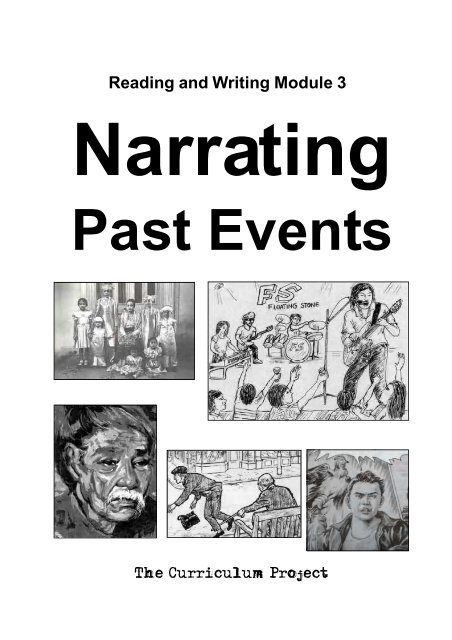
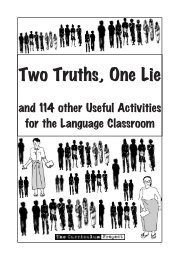
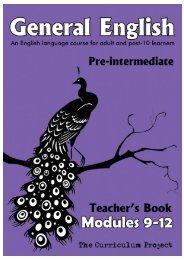
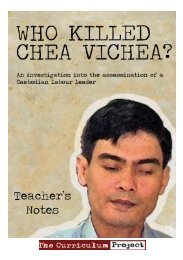
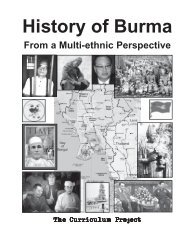
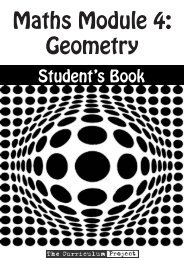

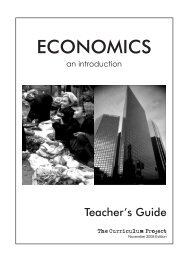
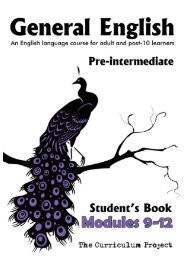

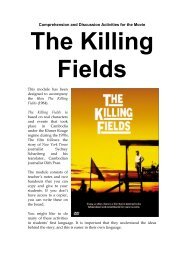
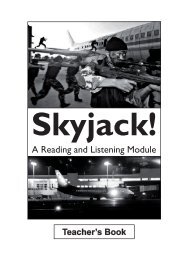
![[Eng] Nov 2012 DRAFT - The Curriculum Project](https://img.yumpu.com/45590859/1/184x260/eng-nov-2012-draft-the-curriculum-project.jpg?quality=85)
